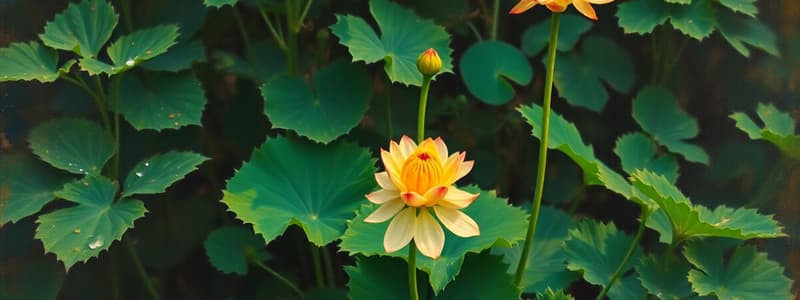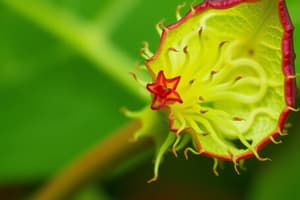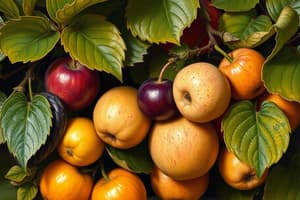Podcast
Questions and Answers
What is botany?
What is botany?
The scientific study of plants, including their structure, properties, biochemical processes, classification, and interactions with their environment.
Name five subdisciplines of plant biology.
Name five subdisciplines of plant biology.
Plant Anatomy, Plant Physiology, Plant Taxonomy, Plant Ecology, Plant Genetics.
All living organisms are composed of one or more cells.
All living organisms are composed of one or more cells.
True (A)
Nonliving things exhibit the same characteristics as living organisms.
Nonliving things exhibit the same characteristics as living organisms.
What are the six kingdoms of life?
What are the six kingdoms of life?
Which of the following is NOT one of the three domains of life?
Which of the following is NOT one of the three domains of life?
What are the main steps in the scientific method?
What are the main steps in the scientific method?
Which SDG aims to end hunger and achieve food security?
Which SDG aims to end hunger and achieve food security?
SDG 15 focuses on which of the following?
SDG 15 focuses on which of the following?
Flashcards are hidden until you start studying
Study Notes
Botany and its Subdisciplines
- Botany is the scientific study of plants, encompassing their structure, properties, biochemistry, classification, and environmental interactions.
- Plant anatomy studies plant internal structures at the tissue and cellular levels.
- Plant physiology examines plant functions like photosynthesis, respiration, and nutrient absorption.
- Plant taxonomy classifies and names plants, focusing on identification, nomenclature, and categorization.
- Plant ecology investigates plant-environment interactions and relationships with other organisms.
- Plant genetics studies plant heredity, including gene structure, function, and variation.
Living vs. Nonliving Things
- Living organisms share characteristics: cellular organization, metabolism, growth and development, reproduction, response to stimuli, and homeostasis.
- Nonliving things lack these characteristics; they are not cellular, don't metabolize, reproduce, or respond to stimuli like living organisms.
Biological Classification: Kingdoms and Domains
- Six Kingdoms: Archaebacteria (extremophile bacteria), Eubacteria (common bacteria), Protista (single-celled eukaryotes), Fungi (decomposers), Plantae (photosynthetic plants), Animalia (multicellular heterotrophs).
- Three Domains: Bacteria (true bacteria), Archaea (ancient microorganisms), Eukarya (eukaryotic organisms including Protista, Fungi, Plantae, and Animalia).
The Scientific Method
- The scientific method involves observation, hypothesis formulation, experimentation, data analysis, conclusion drawing, and publication.
- Science is empirical, evidence-based, and focused on reproducible results, unlike subjective fields like philosophy or art.
Contemporary Global Challenges and SDGs
- SDG 2 (Zero Hunger): Aims to end hunger, ensure food security, and promote sustainable agriculture.
- SDG 13 (Climate Action): Prioritizes urgent action against climate change and its impacts.
- SDG 15 (Life on Land): Focuses on protecting, restoring, and sustainably using terrestrial ecosystems; managing forests; combating desertification; and halting biodiversity loss.
Studying That Suits You
Use AI to generate personalized quizzes and flashcards to suit your learning preferences.




